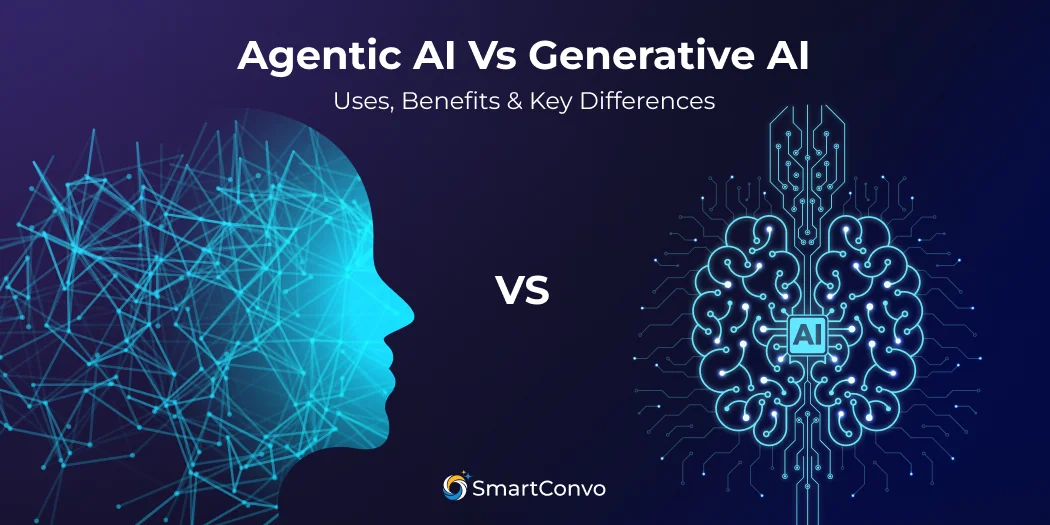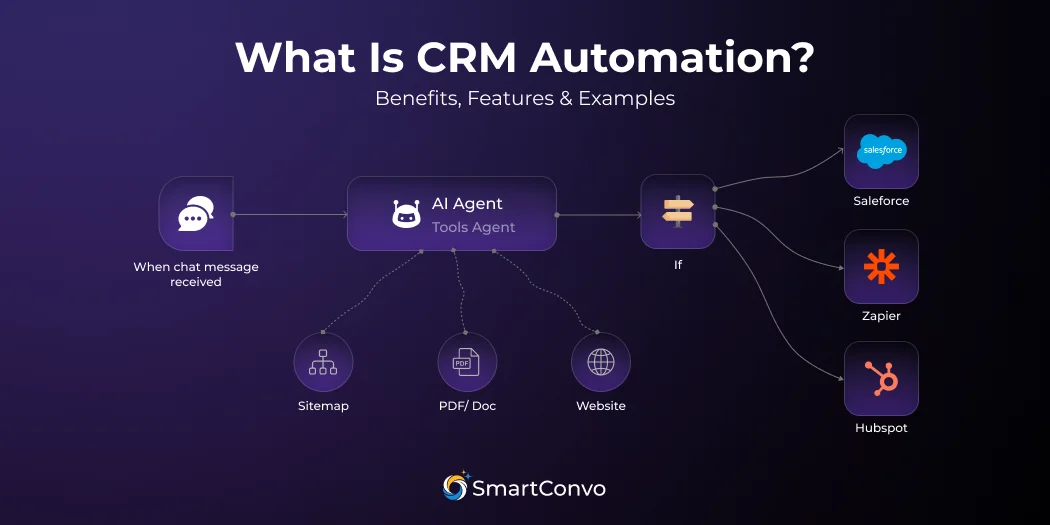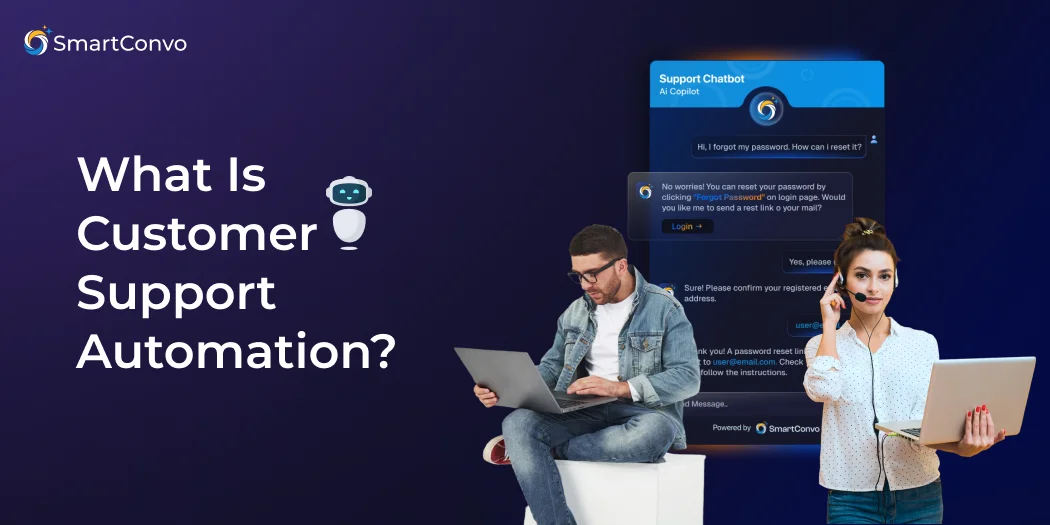AI chatbots revolutionize customer-business interaction and operations management. Whether it’s customer support or sales, the benefits of chatbots include skillfully handling tasks, saving time, and reducing costs. They are being used in almost every industry, providing businesses with a cost-effective way of engaging users. Nevertheless, some drawbacks are there for chatbots.
On one hand, chatbots are technologically advanced in the field of conversation AI; on the other hand, they fail to tackle some of the more complex queries and are unable to perceive emotions or feelings. Moreover, they always require integration and updates. The blog will focus on the advantages and disadvantages of AI chatbots, their main benefits, challenges, and related applications. Let’s get started!
What are AI chatbots?
AI chatbots are computer programs designed to communicate with users through text or voice interactions. Unlike simple rule-based bots, modern LLM-based chatbots use advanced machine-learning models to understand and generate human-like responses. They have immense mechanization in answering queries and automating several tasks in the low-level operations of customer support, HR, healthcare, and retail. AI automation is used to create a better user experience while saving large amounts of money, with guaranteed 24/7 availability.
Different Varieties of AI Chatbots
Rule-Based Chatbots: These chatbots operate using predefined scripts and respond based on specific keywords or commands. They follow a structured decision tree and can only handle queries they have been programmed for. While they work well for basic FAQs, they struggle with complex or unexpected inputs.
AI-Powered Chatbots: These chatbots use machine learning and conversational AI to understand and respond dynamically to user queries. Unlike rule-based bots, they learn from interactions, adapt to user behavior, and provide context-aware, human-like responses. They are ideal for handling complex conversations and offering personalized experiences.
Hybrid Chatbots: A combination of rule-based and AI-powered chatbots, these offer the best of both worlds. They use scripted responses for common queries while incorporating AI capabilities for more advanced interactions. This makes them more flexible and efficient in handling a wider range of customer inquiries.
AI chatbots are constantly evolving to aid businesses in automating communications based on more personalized interaction. However, it’s crucial to understand the advantages and disadvantages of chatbots before integrating them into business operations.
Advantages of AI Chatbots

AI chatbots are transforming the way businesses interact with customers and manage operations. They offer efficiency, cost savings, and 24/7 availability, making them a valuable tool across various industries. Below are the key advantages of AI chatbots:
1. 24/7 Availability
AI chatbots have no closing hours. Whether it’s late at night or during peak hours, they ensure customers get immediate responses. This is particularly useful for businesses with a global audience, allowing them to offer support without time zone restrictions.
2. Cost Efficiency
One of the benefits of AI chatbots is cost efficiency. Staff requirements are reduced and costs for training abolished yet provide consistent services. With the implementation of HR chatbots and sales chatbots, thousands of queries are processed and still have low overhead costs.
3. Quick Responses
Fast replies are what customers want, and AI chatbots deliver that. Rather than waiting in long queues, people get answers immediately which improves customer satisfaction. The LLM-based chatbots can process a lot of data within seconds, providing accurate and relevant information at lightning speed.
4. Personalized Customer Experience
AI chatbots analyze user behavior and past interactions to tailor their responses. This helps create a more engaging and customized experience, whether through product recommendations, personalized greetings, or context-aware replies. Sales chatbots in e-commerce, for instance, suggest products based on customer preferences.
5. Enhanced Data Collection and Insights
AI chatbots don’t only answer questions but also capture usable data. This allows organizations to identify the core problem areas, consumer behavior, and business enhancement on interaction. HR chatbots provide valuable insights into employee concerns, while customer support chatbots help businesses identify recurring problems.
6. Automates Repetitive Tasks
Handling repetitive inquiries takes a lot of time. All daily tasks from setting appointments to frequently asked questions (FAQs) or even transactions are taken care of by AI chatbots. Therefore, humans are freed up to complete more complex meaningful work. It streamlines processes, such that AI automation makes operations more efficient.
Disadvantages of AI Chatbots

While AI chatbots offer numerous benefits, they also come with certain challenges and limitations. Understanding these drawbacks helps businesses make informed decisions when implementing chatbot technology.
1. Limited Understanding of Complex Queries
While LLM-based chatbots are getting smarter, they still struggle with highly specific or unusual questions. If a chatbot isn’t trained on a particular topic, it may provide incorrect or generic responses.
2. Lack of Emotional Intelligence
AI chatbots surely lack empathy, and that incapacity makes them quite ineffective in cases that require a little emotion. The AI understands words or phrases but fails to “really” know them emotionally, like a human agent. Impersonal interactions are characterized by these situations, especially with customer service or healthcare.
3. Dependence on Training Data
Inaccurate or outdated training datasets may misguide a chatbot, as it is only as good as the data sets it relies on. All AI agents require regular updating to keep up with the time, and their maintenance and functioning continue to be dependent on their relevance and accuracy.
4. Technical Issues
Artificial intelligence chat systems can be faulty, like any other technology. A query could be misinterpreted or a request could fail to get processed. When there are system downtimes, one comes across some technical glitches, and businesses dependent on automation using AI should keep getting these systems thoroughly tested or maintained.
5. Privacy and Data Concerns
Most AI chatbots store user data retrieved; this is one reason for their mentioned security problems. Regulations like the General Data Protection Regulation and the Central Consumer Protection Act must be complied with by a business to protect the information of a user. To ensure the sensitive data is not lost, there should have to be security measures.
6. Initial Setup Costs
Setting up AI chatbots incurs a big cost at first, and then later, it pays out with savings. It takes time and resources to develop, integrate, and fine-tune conversational AI solutions. Hence companies should have their chatbot strategy aligned with their organizational goal to ensure the costs are justifiable.
The pros and cons of chatbots are evident across various industries. On the one hand, they offer efficiency, cost savings, and improved customer experiences. On the other hand, they have limitations, such as lacking emotional intelligence and requiring constant updates. Businesses must weigh these factors when integrating AI-powered chatbots into their operations.
Best Uses of AI Chatbots

AI chatbots are changing numerous industries to increase efficiency, reduce operational costs, and enhance customer experience. An added benefit of AI chatbots is that they automate conversations and processes, and may therefore be applied to a great extent when it comes to customer support, e-commerce, education, health care, human resources, and lead generation. Here are the best ways through which businesses and organizations implement AI chatbots:
1. Customer Support
AI chatbots have transformed customer support by providing instant assistance. Companies use conversational AI to manage inquiries, complaints, and troubleshooting. The benefits chatbot also include reduced waiting time for customers, handling very high volumes of queries, and providing support 24/7. Most businesses have somehow merged chatbots into their websites, messaging apps, and telephony systems to have a well-synchronized communications channel. Apart from that, there are highly developed chatbots, too, that know the customers’ feelings and escalate for human assistance if they find a problem to solve in that context, thus providing a personal touch to the experience.
2. E-commerce Support
Retailers rely on chatbots for sales to enhance the shopping experience. AI-based bots recommend a product, answer FAQs, provide discounts, etc., and assist in checking out. Shopify App Store owners leverage AI-driven chatbots to personalize customer interactions, suggest relevant products, and streamline the purchasing process. Chatbots analyze the purchase history and behavior of users to increase conversions. Post-purchase order tracking, returns, and inquiries about orders are now handled by chatbots based on LLMs. Some businesses have even gone to the extent of including voice-enabled chatbots to facilitate shopping through smart devices, making e-commerce much more convenient and engaging.
3. Lead Generation
AI chatbots play a crucial role in capturing and qualifying leads. Sales chatbot are used by businesses to engage visitors, collect contact information, and nurture leads down the sales funnel. Integrated into a business’s CRM system, chatbots help the storing and analyzing of customer data and allow the sales team to prioritize their work on high-quality leads. AI automation also helps in personalized messaging and targeted marketing campaigns, both of which enhance customer engagement and amplify the ROI.
4. Education and Training
Educational institutes as well as e-learning platforms are using LLM-based chatbots to create a thrilling and personalized learning experience. These AI-enhanced, intelligent assistants help students in getting study materials, quizzes, and instant answers to academic queries. By availing the services of HR chatbots, companies facilitate onboarding, company policies, and the development of employee skills. AI automation is meant to ensure that learning, whether for students or professionals, is not only accessible but also efficient and entertaining at all times.
5. Healthcare Services
As far as healthcare is concerned, AI chatbots have opened new avenues in terms of efficiency and convenience. Most of them would include appointment scheduling, answering medical queries, and providing health advice. Many conversational AI chatbots contribute to the assessment of symptoms, medication tracking, and reminders for patients. Hospitals use chatbots to manage administrative tasks, reducing staff workload and streamlining patient interactions. AI agents are also being used in mental health support, offering therapeutic conversations and directing individuals to professional help when needed.
6. Employee Support
Companies use HR chatbots to streamline payroll inquiries, leave requests, benefits enrollment, and workplace policies. Employees would no longer have to wait for HR representatives, providing a smooth and less stressful process for internal functioning. Chatbots also aid with performance assessments, career growth, and programs related to wellness in the workplace. AI agents facilitate remote team working by assisting with meetings, reminders, and tracking productivity, providing a hitch-free collaboration experience in hybrid work settings.
No Credit Card Required | 14 days Free Trial
Build Your Chatbot
Conclusion
These AI chatbots are so effective in the use of businesses that they revolutionize customer support, sales, HR, healthcare, and even education. It provides answers quickly, reduces workloads, makes customer experience superb, and has become an essential tool in a digital-first world. Automating through LLM-based chatbots and AI also enables companies to cut costs, improve efficiencies and remain available 24/7 to customers, all the while keeping pace with rising customer expectations.
These are just some of the advantage and disadvantage of chatbots, but there are also problems associated with them. Chatbots can deal with volumes of inquiries, provide immediate responses, and deliver personalized services; but they lack comprehension of most complex requests, emotional interpretation, and data privacy. Hence, finding the appropriate balance creates the need for conversational AI so that people can be available for more personal or sensitive transactions.
AI chatbots are constantly improving through the advancement of their machine learning and further advancements in NLP (natural language processing) and AI agents, creating bots that understand more human-type conversations. Understanding chatbot advantages and disadvantages is crucial for businesses looking to implement this technology effectively. Businesses that embrace this technology today will not only enhance customer satisfaction but also future-proof their operations, ensuring they stay competitive in a fast-changing digital landscape. As chatbot technology continues to evolve, companies that integrate AI-powered automation will see higher efficiency, stronger customer relationships, and increased profitability.
Frequently Asked Questions (FAQ)
AI chatbots are available 24/7, reduce costs, provide instant responses, handle multiple customers at once, and improve user experience with personalization.
They offer quick responses, automate repetitive tasks, and provide 24/7 support, making customer service faster and more efficient.
AI chatbots are widely used in e-commerce, healthcare, banking, customer support, and travel industries to improve efficiency and customer interactions.
Yes, many AI chatbots support multiple languages, allowing businesses to serve a global audience without hiring multilingual staff.
Yes, AI chatbots help businesses save money, improve customer engagement, and boost sales, but they should be used alongside human support.













